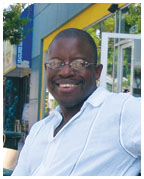|
Web Exclusives: Alumni Spotlight April 19, 2006:
Helping kids in trouble
On any given day, David Sanders ’79 is responsible for the welfare of nearly 40,000 children, none of them his own. As director of Los Angeles County’s Department of Children and Family Services, Sanders oversees the nation’s largest child-welfare system. Leading the mega-agency is a heavy responsibility for a clinical psychologist who thought he would wind up in private practice or running a small clinic. When L.A. County hired Sanders in 2003, its family services department was like a foster child itself, passed from director to director as the Board of Supervisors fired its leaders every few years. Adding to the challenge, the county’s children’s shelter had been shut down to settle a lawsuit that claimed the shelter was a dumping ground for troubled children. That happened three weeks before Sanders’ arrival. “Other than law enforcement, I can’t think of any government agency that draws such attention, especially if things go wrong,” says Sanders. Sanders says he is making steady progress in L.A. Abuse rates in foster care have been cut in half, he says. On average, children are adopted nine months sooner than before he arrived. And, he adds, fewer children are being cared for by adults who aren’t their parents or relatives. In the past, “we saw our job as rescuing children [by removing them] from dangerous families,” says Sanders, a psychology major at Princeton. “It’s necessary to do that in some situations, but the work can’t be to take children out of their families.” Most referrals to Sanders’ department result from neglect, not abuse, he says. Parents’ drug problems and mental health issues are often to blame, so Children and Family Services offers assistance and hooks parents up with other agencies and community providers. “Taking away their children ends up being a real disincentive for people to get the kind of help that they need,” Sanders says. For the children, the trauma of being removed from their homes “is so significant that we really need to be sure it’s fully necessary before we do it.” Children are still separated from their families, say Sanders, but that is done with more consideration — and less frequently — than before he took charge. Another Sanders initiative sends social workers along on narcotics and gang raids to tend to any children left behind when the adults are hauled away. Sanders’ tenure in Los Angeles has not been without controversy.
Last fall, after a court removed her from foster care, a 2-year-old
girl died, allegedly beaten by her aunt and uncle. Sanders’
department has also taken flak for housing children overnight in
an office. Now an emergency network of foster families and around-the-clock
group homes fills the gap, says Sanders. He still has his job. His
goal, he says, is not just to lead the largest urban child welfare
system in the country, but to lead the best. By Massie Ritsch ’98 Massie Ritsch ’98, a former Los Angeles Times reporter, is the communications director for the Center for Responsive Politics in Washington, D.C.
|
||

